
Pharmaceutical supply chains are tightly regulated; they must be in order to pass FDA inspection and maintain high productivity levels. Because of such tight regulation, their products are also subject to stringent labeling requirements. To ensure products along the supply chain are adequately labeled, many companies are now relying on the newest and most advanced labeling technologies afforded by companies like LabTAG, Seagull, as well as many high-end thermal printer manufacturers.
RFID in the pharma supply chain
Any talk of advanced identification technology starts and often ends with radio-frequency identification (RFID). RFID isn’t exactly new; the technology itself has been around since the 70s, but recently, substantial improvements in RFID technology have made it much more cost-efficient.
So, how does this affect the pharmaceutical supply chain? We’ve covered many of the advantages of RFID before:
- Scan from a distance, without a direct line of sight
- Scan multiple tags simultaneously
- Tags can be rewritten as many times as needed
- High storage capacity
- Increased level of security
These features give everything in the supply chain optimal trackability and traceability, as all tubes, vials, bioreactors, and other containers used during production as well as pill bottles shipped to and sold in the pharmacy can be encoded with all necessary information, from batch numbers to the date and time it was processed. All pertinent data can be assessed in an instant without scanning each individual code. This can help remedy inefficiencies in the supply chain, especially those that originate from poor inventory management. With RFID, companies can better manage expiry dates, recalls, and stock inflow and outflow, potentially saving large manufacturers anywhere from 17$ million to 55$ million annually. RFID labels and tags also make it possible to quickly trace contaminated batches, reducing the likelihood of harm caused by a defective product.1
RFID likely isn’t used as frequently as it ought to be in pharmaceutical supply chains, mainly because it’s only recently that RFID technology was capable of being adapted to the variety of conditions needed for pharmaceutical development. Manufacturing therapeutics involves liquid nitrogen cold storage, autoclaves, and frequent exposure to alcohols and other solvents, and RFID tags were not previously accustomed to these conditions. New to this field is the ability to provide an RFID inlay with any type of label. That means that RFID can be integrated into temperature-, heat-, and chemical-resistant labels, to be used as many times as necessary throughout the supply chain, from beginning to end.
Using the right software is essential
Software is an essential component of any supply chain, whether it’s used to control major components, like inventory, or simply used to scan items. Reporting and compliance are crucial measures to following FDA regulations, so it’s vital that whichever system you choose, it can be trusted to account for everything, from inventory to incidents.
One thing to look for when selecting software, whether it’s for supply chain management, inventory management, or label printing, is its adaptability. It’s important that all software be capable of integration. For instance, certain kinds of software, like BarTender, can be directly integrated into many types of other management systems so that databases containing identifiers can be instantly linked between the two systems. This makes printing labels much faster and reduces errors caused by manual data input.
Another thing to consider is the capabilities of your software to generate both barcodes and RFID. For labels with RFID inlays, it is also possible to print barcodes (ideally with a thermal-transfer printer to provide maximum protection against abrasion, chemicals, and extreme temperatures) on the facestock as a secondary tracking method. That means not only having a printer with these capabilities but software as well. BarTender is a recommended option, as it has the ability to not only design and print barcodes but also simultaneously encode RFID labels using the appropriate RFID enabled printer.
Label customization for adaptable supply chains
As stated before, RFID is a much more attractive identification technology nowadays due to its ability to come with any label. However, the correct label must be used for each appropriate condition, particularly in the supply chain, where even a single mishap can stop the chain in its tracks. This means that just one label that fails can cause significant losses and potential harm to patients.
Working with a manufacturer that can customize labels, not just orders, is advantageous for several reasons. Customizing labels means that during development, a solution can be constructed that aims to fit the exact need regardless of the environment. In this case, it helps to have the right personnel with the expertise to understand the specific requirements of pharma companies. By partnering with a label manufacturer, it is possible to thoroughly test the solution before being implemented wholesale throughout the chain. This allows for a period of optimization to ensure the solution works as intended.
There are many ways to enhance productivity and reduce errors along pharmaceutical supply chains. For pharmaceutical companies, it’s essential not just to advance new therapies but to keep improving how they’re produced, tracked, and traced. Ultimately, these drugs are made for the public, and having the best security measures in place means a safer, more cost-effective product.
LabTAG by GA International is a leading manufacturer of high-performance specialty labels and a supplier of identification solutions used in research and medical labs as well as healthcare institutions.
Reference:
- Coustasse A, Kimble CA, Stanton RB, Naylor M. Could the Pharmaceutical Industry Benefit from Full-Scale Adoption of RadioFrequency Identification (RFID) Technology with New Regulations? Perspectives in Health Information Management. 2016:1-16.